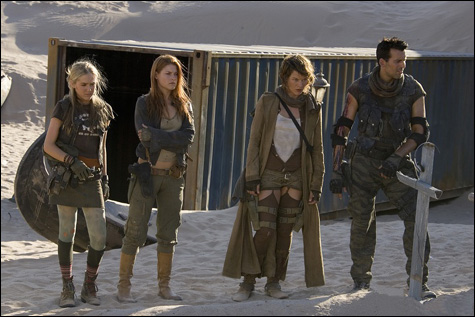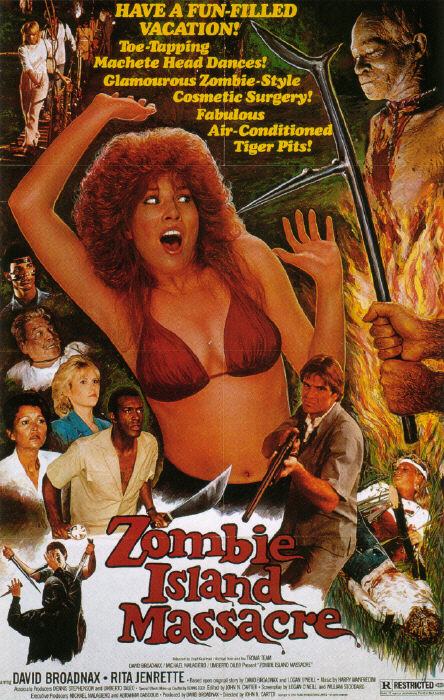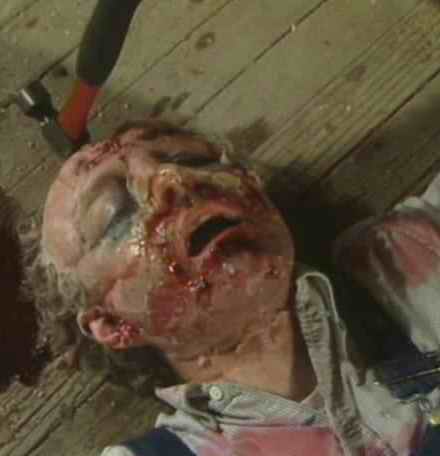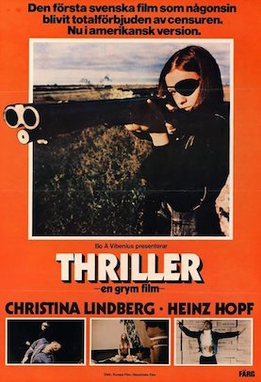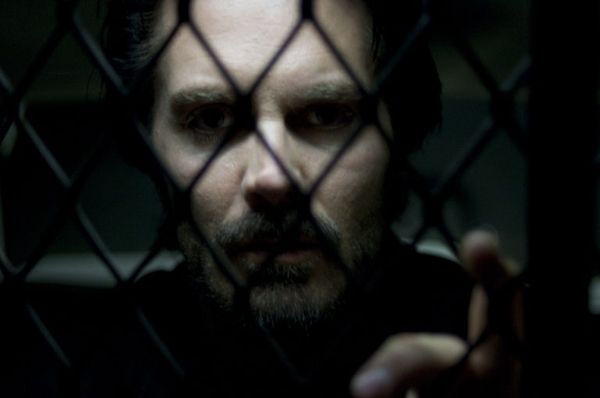Salò, or the 120 Days of Sodom
by Pier Paolo Pasolini
 Salò is told in four parts, the first of which is the Antechamber (small room leading to a bigger room) of Hell. As Mussolini's Italy crumbles, four men known only as The Duke, The President, The Bishop and The Magistrate (mostly referred to as "Your Excellency") sign an agreement in a posh looking office and offer cryptic hints as to what it is. One clue above all others stands out, "All's good if it's excessive". Italian fascist soldiers round up several young men and women and the four men pick and choose nine of each, aided by three women - Signoras Castelli, Maggi and Vaccari. They take their captives (two of whom die before the plot is revealed to us in full) to a villa and explain just how much they're going to wish they'd never been born. That agreement was a set of rules by which they are going to live and they're quite grim indeed. The rules are roughly: No religion, no consensual sex, orgies after dinner while one of the signoras tells an 'erotic' story, and the word of the four men is law. The libertines also capture a few extra young men and force them to be guards.
Salò is told in four parts, the first of which is the Antechamber (small room leading to a bigger room) of Hell. As Mussolini's Italy crumbles, four men known only as The Duke, The President, The Bishop and The Magistrate (mostly referred to as "Your Excellency") sign an agreement in a posh looking office and offer cryptic hints as to what it is. One clue above all others stands out, "All's good if it's excessive". Italian fascist soldiers round up several young men and women and the four men pick and choose nine of each, aided by three women - Signoras Castelli, Maggi and Vaccari. They take their captives (two of whom die before the plot is revealed to us in full) to a villa and explain just how much they're going to wish they'd never been born. That agreement was a set of rules by which they are going to live and they're quite grim indeed. The rules are roughly: No religion, no consensual sex, orgies after dinner while one of the signoras tells an 'erotic' story, and the word of the four men is law. The libertines also capture a few extra young men and force them to be guards.So begins part two: The circle of obsessions. The stories of the three women begin in earnest and dictate the behavior of the four old men and their young male collaborators. The 16 captives are undressed, subjected to rape, violence, molestation, forced marriages, attempted murder and copulation with one another; all of the acts happen mostly at random, the captives find little to no solace in anything and joy is non-existent. The old men jest with one another and quote Barthes and talk about violence without actually talking about it. They note dissent down in a notebook they call the "punishment book" and their orders get more and more inhumane. Just when things don't seem like they could get any more debauched or heavy, part three kicks in: The Circle of Shit. It's pretty much what it sounds like. After one of the Signora's inspires them with a story the Duke attempts to punish one of the girls whose crime is crying over her dead mother by making her eat his feces. The scene that follows, of a coprophagous 'banquet', is one of the few times I've actually been physically incapable of not looking away to spare my stomach (the castration in I Spit On Your Grave had roughly the same effect). The Circle of Blood, the fourth part, concerns that punishment book. Those who have been marked down for bad behavior will be taken to Salò and those who have not can choose to die or collaborate. I don't think I need to tell you what happens in Salò; after all there are only so many things left to do to someone once they've been through the Circle of Shit.
Watching Salò is one of the single most unpleasant things you're likely to do in your lifetime should you choose to. Let's get a few things straight before I continue: I do not feel smarter or more well-adjusted having seen the film (twice now. This was foolish I admit, but I had only vague recollections of the film after having watched it in my first semester of college. It isn't that it was all that long ago, but my brain had tried to bury it because of my reaction the first time around and I can say that I remembered many things incorrectly; in order to understand/judge the film properly, a second viewing was necessary). I do not consider myself more worldly or better fit to review films designed to disgust; Salò is a movie and has limited power as such. I don't lord this over people who haven't seen it because while I get that watching a film with a ghastly reputation can seem like something cool to do to boost your ego, I won't attempt any such thing with Salò, first because it is so troubling a film, and second because Criterion's new (and really impressive) DVD is available on Netflix and at Barnes and Noble along with Independence Day and Must Love Dogs. If you want to watch it, go right ahead, I just can't say you'll feel much better for having done so. It is not imperative viewing and it won't help your understanding of the world, it may just darken it a bit. You will however understand Pier Paolo Pasolini better, if you have any interest in doing that.
Granted, Salò is an incredibly fascinating film, even without its director's biographical line-blurring. Reviewing Salò without mentioning the fact that shortly after the film was finished, Pasolini was murdered by a male prostitute is like reviewing The Girlfriend Experience without mentioning that Sasha Grey is a pornstar or Moon without mentioning that Duncan Jones is David Bowie's son. Like the author Yukio Mishima (whose death was remarkably similar in the context of his life and work), Pasolini had kept his homosexuality a secret (from the press, anyway) for much of his adult life, though he openly sought homosexual encounters. He was expelled from his beloved communist party in the 40s because of his homosexuality and this clash between the many things in his life would characterize his work until his death. Like Mishima he hated himself and found the world to be too full of problems, believing that fiction was the only way to truly live and express oneself. Pasolini succeeded where others failed in making films that worked as philosophical texts as well as narrative. Before Salò, he had made a trilogy of films based on classical literature - The Decameron, The Canterbury Tales and A Thousand And One Nights - infused with playful and innocent nudity and sexuality. Though he loved the human body, he grew to hate it because the 70s was, as noted above, a time for taboo breaking. This meant that on top of great cinema and revolution you also had porn, advertising, television, junkfood, drugs, apathy, and violence. By 1975, he'd had his fill. He could find no solace in communism or art and he decided the next step would be to make the antithesis of his trilogy, which affirmed his love of life, and make three films about death - he only lived to see one completed.
 Salò is pretty much what I expected - angry, blasphemous, violent, grotesque, visceral - but what I wasn't expecting was its presentation. Pasolini, disillusioned though he may have been, always found time for a fully realized mise en scène. Mamma Roma and Accattone were tough films to watch content-wise but were very at least interestingly shot. Salò has no artifice, you simply see things, and they're hideous. His camera work is as uncomplicated as possible; in fact the whole film feels so simple, which I think adds to the uneasiness it causes in the viewer. Many of the actors were not actors at all and so the smiling you occasionally catch them doing may or may not be intentional, but isn't that just awful? Smiling while people are being murdered and raped? It's inappropriate, which in a film like Salò is perversely appropriate. The effects of such bizarre shrugs of the filmmakers shoulders are another example of the accidental repulsion you experience in the film's lighter moments. Pasolini was no horror director so his effects occasionally look as bad as Sergio Martino's or Dario Argento's, but that doesn't behoove him as it does his colleagues in the flesh-and-blood game. The scalping, the tongue being removed, the eye gouging, and whatever else looks stagey, but that doesn't make a damn bit of difference. Like The Godfather, Salò is a masterpiece of tone, which means that Pasolini could have shown you anything he damn well pleased and it would have turned your stomach, such is the atmosphere he perfected. In fact he does just that by having The Duke, The Magistrate, and The President dress up as women in full, lavish dresses and later dance as if on a kick line and it's just as horrifying in its absurdity as anything else. Everything you see is there because Pasolini wants you to see it and so every emotion you feel has been masterfully orchestrated by our auteur. It's a profound bit of manipulation but it works in the way it's supposed to which makes Salò a most difficult film to watch (if not the most) and its director one of the greatest artists who ever lived. So it is with some reluctance that I grant Salò an A, despite my issues with it.
Salò is pretty much what I expected - angry, blasphemous, violent, grotesque, visceral - but what I wasn't expecting was its presentation. Pasolini, disillusioned though he may have been, always found time for a fully realized mise en scène. Mamma Roma and Accattone were tough films to watch content-wise but were very at least interestingly shot. Salò has no artifice, you simply see things, and they're hideous. His camera work is as uncomplicated as possible; in fact the whole film feels so simple, which I think adds to the uneasiness it causes in the viewer. Many of the actors were not actors at all and so the smiling you occasionally catch them doing may or may not be intentional, but isn't that just awful? Smiling while people are being murdered and raped? It's inappropriate, which in a film like Salò is perversely appropriate. The effects of such bizarre shrugs of the filmmakers shoulders are another example of the accidental repulsion you experience in the film's lighter moments. Pasolini was no horror director so his effects occasionally look as bad as Sergio Martino's or Dario Argento's, but that doesn't behoove him as it does his colleagues in the flesh-and-blood game. The scalping, the tongue being removed, the eye gouging, and whatever else looks stagey, but that doesn't make a damn bit of difference. Like The Godfather, Salò is a masterpiece of tone, which means that Pasolini could have shown you anything he damn well pleased and it would have turned your stomach, such is the atmosphere he perfected. In fact he does just that by having The Duke, The Magistrate, and The President dress up as women in full, lavish dresses and later dance as if on a kick line and it's just as horrifying in its absurdity as anything else. Everything you see is there because Pasolini wants you to see it and so every emotion you feel has been masterfully orchestrated by our auteur. It's a profound bit of manipulation but it works in the way it's supposed to which makes Salò a most difficult film to watch (if not the most) and its director one of the greatest artists who ever lived. So it is with some reluctance that I grant Salò an A, despite my issues with it. That doesn't make Salò a good film before you think I'm siding with him just cause he was an artist. It's not entertaining even if it can justify its existence (if you like this movie, like, you watch it on rainy days, I hope you're doing it safely within the walls of a home for the criminally insane). The acting not done by Paolo Bonicelli is either too much or not enough and the script is painfully fraught with completely unnecessary literary references that a movie shouldn't need to work on its own. And beyond that Salò is as cruel and vile as anything by Marino Girolami or Jesús Franco and it certainly feels just as dirty as Men Behind the Sun or Cannibal Holocaust, but because Pasolini was making capitol-'A'-Art, there is a message that doesn't get lost in the shuffle. It helps that it starts with its message and doesn't work its way backwards like Umberto Lenzi's films always did. No, no, Pasolini lets you know up front in an astoundingly pretentious gesture that this will not be a regular film by giving you a recommended reading list before the film even starts. No joke. He opens with a list of books by Pierre Klossowski, Simone de Beauvoir, Roland Barthes, Philippe Sollers, and Maurice Blanchot, as if he wasn't being pedantic enough making 'theoretical' cinema. This may be the most non-Warholian condescending gesture in film history. What does it help you understand? As someone who hasn't read a one of them let me tell you that you don't need them to not enjoy Salò, you can do that just fine on your own; the reading list drives home some points that can be found in visual cues anyway. The important stuff you can glean on your own if you have a passing familiarity with communism, fascism and anti-consumerism.
In fact you needn't even be familiar with the writings of Marquis De Sade (it helps you get things like that 'tears of blood' line, but that doesn't matter in the least), cause let's face it Pasolini could have cared less about the 120 Days of Sodom. There are a number of parallels between the film and the book; The Marquis wrote The 120 Days while in prison (Pasolini was in a sort of repressive state of his own) and when it finally got released, posthumously, it was banned; Salò was banned posthumously and like its source novel was completed in 37 days (though, to be honest, that may or may not be true). But the thing is both the Marquis and Pasolini were pretty self-obsessed but in crucially different ways. Donatien François wrote The 120 Days believing that he'd be dead very, very soon; in fact the only reason he survived was because of a riot that turned into a massive prison break. He thought he was going to die so he recorded his filthiest desires on a long scroll and then afterwards claimed it was art. Pasolini had no clue he'd be killed when he started Salò and so its grim nature is all the more surprising. People often say that they weren't shocked by Salò because they had read The 120 Days of Sodom. Well, yeah, that's all well and good but reading about somebody eating shit and actually seeing it are two vastly different things. Film can elicit the sort of reaction that literature and photography can't. Books suggest life and death; film can show it, a privilege that many people have abused - namely everybody I've chided in these segments entitled Where I Draw The Line, Pasolini excluded. I don't care how familiar you are with the process of making fake shit, there's no way to find comfort in watching part three of Salò. That there is no comfort is precisely the point of the film; Salò is a film that is impossible to enjoy. Pasolini had been so filled with discontent about the modern world that Salò (and presumably it's unmade sequels) was all he had left in him. He had seen every good and pure thing corrupted and he wanted to let the world know how he felt: alone. Communism offered him no respite (Ezio, one of the guards dies while giving the communist salute), sex is vile, nudity perverse, literature and storytelling used to justify evil, even eating is turned into something unthinkable. Bodies are treated as objects for fucking and degradation, men and women, unlike the majority of Italian films who favored women in this kind of reduction, are lower than animals. The prisoners are led around in dog collars in one scene and made to piss on command; these are not people in the eyes of the libertines. And because you (any audience member) are watching it, you're guilty of these crimes and (on top of it all) voyeurism. Pasolini couldn't even find comfort in film; film is a weapon in his hands. "I Fucking Dare You!" he shouts and then punishes you for your conformity, your complacency. Pasolini, as he remarked in his most famous article "I Know", was taking no prisoners.
 As a stab at the youth of today (1975), Pasolini finishes an orgy of torture and murder by having two guards just turn off the somber classical piece on the radio to a lively Nino Rota-style waltz and dance with each other. The last lines of the film are completely inconsequential. He hated that apathy had taken hold of the youths he had counted on to change things and all anyone seemed to want to do was have fun when he was so tormented. In the face of the world turning to filth and violence and corruption, kids were changing the channel and dancing, unaware how short life is and how badly we had fucked up. Part of me is glad that Pasolini didn't live to see today (I can't imagine how he'd have felt about George W. Bush); some things have gotten better, most haven't changed and some things have gotten a whole lot worse, especially in Italy. Seeing Salò for the second time makes me understand how troubled he was and how desperately angry and alone he felt. That said, I don't ever want to watch it again and I'm sad that he's gone.
As a stab at the youth of today (1975), Pasolini finishes an orgy of torture and murder by having two guards just turn off the somber classical piece on the radio to a lively Nino Rota-style waltz and dance with each other. The last lines of the film are completely inconsequential. He hated that apathy had taken hold of the youths he had counted on to change things and all anyone seemed to want to do was have fun when he was so tormented. In the face of the world turning to filth and violence and corruption, kids were changing the channel and dancing, unaware how short life is and how badly we had fucked up. Part of me is glad that Pasolini didn't live to see today (I can't imagine how he'd have felt about George W. Bush); some things have gotten better, most haven't changed and some things have gotten a whole lot worse, especially in Italy. Seeing Salò for the second time makes me understand how troubled he was and how desperately angry and alone he felt. That said, I don't ever want to watch it again and I'm sad that he's gone.



